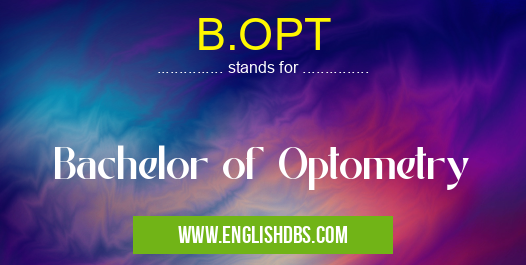What does B.OPT mean in ACADEMIC DEGREES
Bachelor of Optometry (B.OPT) is an undergraduate professional degree in optometry. Optometry is a branch of science concerned with the diagnosis, treatment and management of visual disorders and conditions, such as near-sightedness, farsightedness and presbyopia. The B.OPT degree prepares optometrists for their career by providing them with knowledge regarding the diagnosis and management of vision problems through specialized courses that include topics in optics, anatomy, physiology, ophthalmic instruments and technology. It also focuses on patient safety, counseling skills as well as community awareness. After completing a B.OPT degree, one can practice optometric services independently or join a hospital/healthcare institution to provide services related to vision care

B.OPT meaning in Academic Degrees in Academic & Science
B.OPT mostly used in an acronym Academic Degrees in Category Academic & Science that means Bachelor of Optometry
Shorthand: B.OPT,
Full Form: Bachelor of Optometry
For more information of "Bachelor of Optometry", see the section below.
Essential Questions and Answers on Bachelor of Optometry in "SCIENCE»DEGREES"
What is the meaning of Bachelor of Optometry?
Bachelor of Optometry (OPT) is a four-year professional doctorate degree program that focuses on preparing students to become qualified optometrists. During this program, students learn the fundamentals of optometric technology as well as legal and ethical aspects related to the profession. Upon completion, graduates are prepared to assess ocular health issues, diagnose conditions, and prescribe corrective lenses or other therapeutic treatments.
What qualifications do I need for Bachelor of Optometry?
To be eligible for a Bachelor of Optometry program, applicants must have completed at least two years of undergraduate study. Prerequisite courses include math, chemistry, physics, anatomy and physiology. Some programs may also require additional classes in biology or other science disciplines.
What topics will I learn during a Bachelor of Optometry program?
During a Bachelor of Optometry program, students typically take courses in basic optics and geometric optics; pharmacology; contact lenses; vision science; diseases and treatments; clinical methods; refractive technology; business management and ethics; and many others. Additionally, there may be courses that focus on advanced practices such as vision therapy or low vision rehabilitation.
What kind of career opportunities are available with a Bachelor’s in Optometry?
Graduates with a Bachelors in Optometry can pursue careers as opticians and retail managers in optical stores or laboratories. They can also work as research technicians at pharmaceutical companies or in academia. Additionally, they may find employment as lab technicians at eye care centers or practice limited scope optometry under supervision by an optometrist.
How long does it take to complete the Bachelor's Degree in Optometry?
A Bachelor’s degree in Optometry typically takes four years to complete when studying full-time but can range from three to six years depending upon individual needs such as transfer credits earned from prior studies.
Is online education available for an OPT degree?
Yes, it is possible to earn an OPT degree online although most programs require some form of clinical experience such as rotations or internships at approved facilities which may need to be completed onsite. Students should check with their university’s distance learning department about specific requirements before enrolling in an online OPT degree program.
Are there any specializations for OPT graduates?
Yes! After graduating from an OPT program graduates can specialize in areas such as primary care optometry (including pediatric), geriatric care, sports medicine optometry, ocular disease management,low vision rehabilitation and more!
Are board examinations required after completing a Bachelors' Degree in OPT?
Yes, after graduating from a Bachelors Degree in OPT most graduates must sit the National Board Examination administered by the National Board of Examiners In Optics (NBEO). This examination certifies individuals who wish to practice within their state's parameters according to the standards specified by that jurisdiction's licensing laws/regulations.
